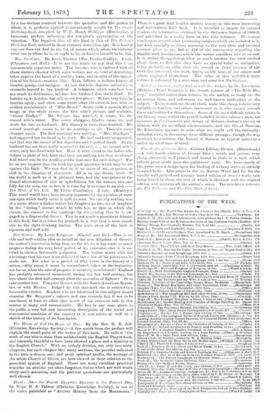Mrs. Cardigan. By Annie Thomas (Mrs. Render Cudlip). 3 vols.
(Chapman and Hall.)—It is not too much to say that this is an uncommonly repulsive novel. The heroine, who is endowed with all those sinister charms which some writers are so fond of describing, takes captive the heart of a wealthy lover, and in spite of the opposi- tion of his friends, marries him. Then follows a tedious history of slander, gossip, and intrigue. At last the wife departs, ostensibly to reconcile herself to her kindred. A telegram, which somehow- does not reach its destination, informs her husband that she is dead. He hurries up to London, but only to see her grave. Before very long, he marries again ; and then, some years after his sister-in-law, with an evident reminiscence of " Blue-Beard," draws aside a curtain which hangs in the study across the first wife's picture, and exclaims, "Sister Gladys!" Mr. Saltoun has married, it seems, his de- ceased wife's sister. The scene changes; Gladys turns up, and sends for her ex-husband. His dismay is more than doubled. His second marriage seems to be no marriage at all. Then the scene changes again. The first marriage was nothing. " Mrs. Cardigan " had supposed her husband to be dead. He had suddenly reappeared, and that was the secret of her departure and reported death. So the husband has not been really married to his real, his second wife's sister, only has lived with her. Does it ever occur to the ladies who delight in plots of this kind that they are nothing less than revolting? And where can be the reading public that care for such-things ? For let no one suppose that the book has good qualities, which may be set against this fault. We can find in it no trace of wit, or pathos, or skill in the drawing of character. All is on one dreary level. If the world is such as it is pictured here, and the exceptions to the dismal alternatives of vice or spitefulness for the women, vice and folly for the men, are so few, it is time for it to come to an end.— The Wish of his Life. By Victor Cherbuliez. 2 vols. (Bentley.) This novel would have been greatly improved by the excision of some passages which really make it unfit to read. We can say nothing less of a scene where a father makes his daughter go into fits of laughter by the "daring" stories which he tells her, or that in which she extorts his consent to her marriage by discovering that he is en- gaged in a disgraceful liaison. Vice is not made a prominent feature in this book, but it is taken for granted, in a way that is more repul- sive to the right-thinking reader. The main story of the book is vigorous and well told.


































 Previous page
Previous page